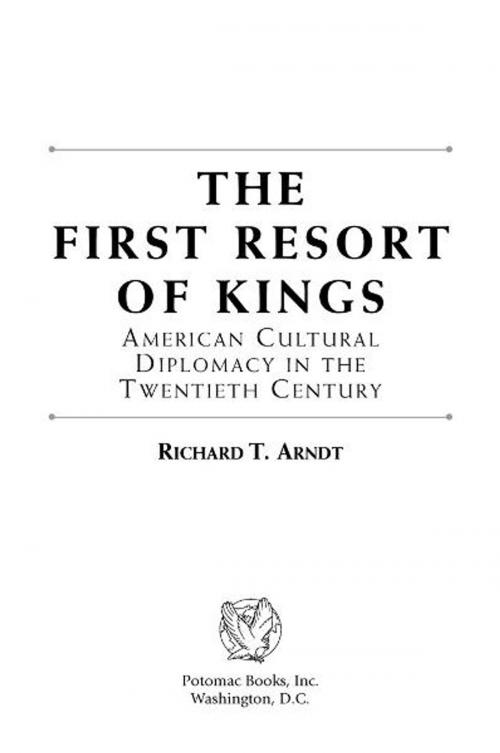The First Resort of Kings
Nonfiction, Social & Cultural Studies, Political Science, International, International Relations| Author: | Richard T. Arndt | ISBN: | 9781612342399 |
| Publisher: | Potomac Books Inc. | Publication: | April 30, 2005 |
| Imprint: | Potomac Books Inc. | Language: | English |
| Author: | Richard T. Arndt |
| ISBN: | 9781612342399 |
| Publisher: | Potomac Books Inc. |
| Publication: | April 30, 2005 |
| Imprint: | Potomac Books Inc. |
| Language: | English |
During the last five decades, U.S. cultural diplomacy programs have withered because of politics and accidents of history that have subordinated cultural diplomacy to public relations campaigning, now called ôpublic diplomacy.ö With anti-Americanism on the rise worldwide, cultural diplomacy should become an immediate priority, but politicians continue to ignore this relatively inexpensive, age-old tool for promoting understanding among nations. Richard Arndt probes the history of American cultural diplomacy to demonstrate its valuable past contributions and to make a plea for reviving it for the future.
Cultural relations occur naturally between people in different nations as a result of trade, tourism, student exchanges, entertainment, communications, migration, intermarriageùmillions of cross-cultural encounters. But cultural diplomacy only happens when a government decides to channel and to support cultural exchange through planned programs to promote broad national interests. The First Resort of Kings examines the first eight decades of formal U.S. cultural diplomacy, from its tentative beginnings in World War I through the 1990s. Arndt also compares AmericaÆs efforts with those of other nations and enriches his narrative by detailing the professional experiences of the men and women who have represented American democracy, education, intellect, art, and literature to the rest of the world. His work shows that this dialogue of American culture and education with the rest of the world is neither a frill nor a domestic political concern but is the deepest cornerstone of a positive, forward-looking U.S. foreign policy. Arndt argues that, particularly in the wake of the Iraq War, America must revive its cultural diplomacy programs as a long-term investment in international goodwill and understanding.
Cultural relations occur naturally between people in different nations as a result of trade, tourism, student exchanges, entertainment, communications, migration, intermarriageùmillions of cross-cultural encounters. But cultural diplomacy only happens when a government decides to channel and to support cultural exchange through planned programs to promote broad national interests. The First Resort of Kings examines the first eight decades of formal U.S. cultural diplomacy, from its tentative beginnings in World War I through the 1990s. Arndt also compares AmericaÆs efforts with those of other nations and enriches his narrative by detailing the professional experiences of the men and women who have represented American democracy, education, intellect, art, and literature to the rest of the world. His work shows that this dialogue of American culture and education with the rest of the world is neither a frill nor a domestic political concern but is the deepest cornerstone of a positive, forward-looking U.S. foreign policy. Arndt argues that, particularly in the wake of the Iraq War, America must revive its cultural diplomacy programs as a long-term investment in international goodwill and understanding.
During the last five decades, U.S. cultural diplomacy programs have withered because of politics and accidents of history that have subordinated cultural diplomacy to public relations campaigning, now called ôpublic diplomacy.ö With anti-Americanism on the rise worldwide, cultural diplomacy should become an immediate priority, but politicians continue to ignore this relatively inexpensive, age-old tool for promoting understanding among nations. Richard Arndt probes the history of American cultural diplomacy to demonstrate its valuable past contributions and to make a plea for reviving it for the future.
Cultural relations occur naturally between people in different nations as a result of trade, tourism, student exchanges, entertainment, communications, migration, intermarriageùmillions of cross-cultural encounters. But cultural diplomacy only happens when a government decides to channel and to support cultural exchange through planned programs to promote broad national interests. The First Resort of Kings examines the first eight decades of formal U.S. cultural diplomacy, from its tentative beginnings in World War I through the 1990s. Arndt also compares AmericaÆs efforts with those of other nations and enriches his narrative by detailing the professional experiences of the men and women who have represented American democracy, education, intellect, art, and literature to the rest of the world. His work shows that this dialogue of American culture and education with the rest of the world is neither a frill nor a domestic political concern but is the deepest cornerstone of a positive, forward-looking U.S. foreign policy. Arndt argues that, particularly in the wake of the Iraq War, America must revive its cultural diplomacy programs as a long-term investment in international goodwill and understanding.
Cultural relations occur naturally between people in different nations as a result of trade, tourism, student exchanges, entertainment, communications, migration, intermarriageùmillions of cross-cultural encounters. But cultural diplomacy only happens when a government decides to channel and to support cultural exchange through planned programs to promote broad national interests. The First Resort of Kings examines the first eight decades of formal U.S. cultural diplomacy, from its tentative beginnings in World War I through the 1990s. Arndt also compares AmericaÆs efforts with those of other nations and enriches his narrative by detailing the professional experiences of the men and women who have represented American democracy, education, intellect, art, and literature to the rest of the world. His work shows that this dialogue of American culture and education with the rest of the world is neither a frill nor a domestic political concern but is the deepest cornerstone of a positive, forward-looking U.S. foreign policy. Arndt argues that, particularly in the wake of the Iraq War, America must revive its cultural diplomacy programs as a long-term investment in international goodwill and understanding.















